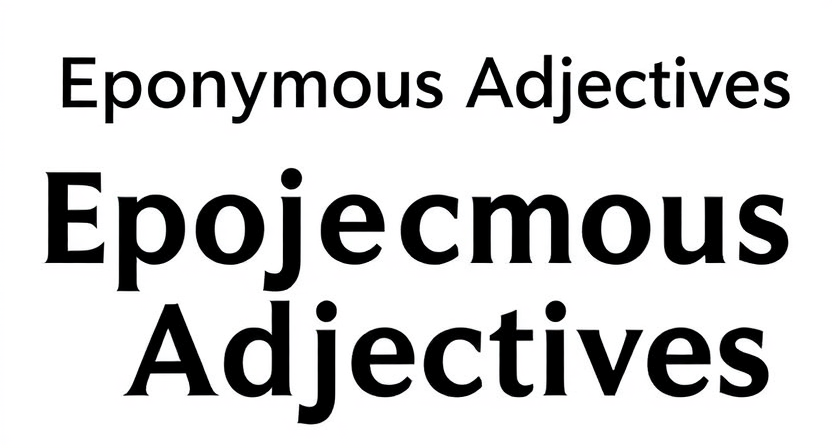Eponymous Adjectives
The flexibility of the English language and its potential to stretch, adapt and mutate knows no bounds. If you are learning English in London you may have noticed how easy a noun turns into a verb ‘google it’ or a verb into a noun ‘the take away from this meeting will be…’, on the streets only at first, then by rules of usage, those become official. If you are learning English in London, chances are that you are becoming quite familiar with the culture and its characters and notice how some names appear to be more than a name and can also undergo such word class transformations.
Everyone has a name, but only a few have an adjective. A person needs to have made quite an impact on a given culture for their names to become an adjective. These adjectives tend to qualify and indeed transmit the essence of that person’s thoughts, deeds, creations or attitudes.
Some lucky (and not so lucky) people have had their names ring through the ages, becoming a commonly used adjective. We call these EPONYMOUS ADJECTIVES. From the Ancient Greek Epi- (upon) combined with the -onuma (name), some eponymous adjectives date back all the way to the Ancient Greeks themselves!
Starting in Greece: Draconian laws/rules – Meaning: Harsh, tough, strict, extreme, or drastic. It comes from Draco, who was a scribe of law from Athens, famous for giving really harsh punishments to minor offences. E.g. “The government’s new laws are draconian, to say the least!”
Of course Britain has its own array of locally developed eponymous adjectives, that you, student learning English in London or other parts of the isle may have come across. Let’s look at some:
In Literature, we have: Byronic – Meaning: Moody, dark, mysterious and alluring. As is the style of poetry and characteristic of the heroes in the works of Lord Byron, the English romantic poet. E.g. “The Byronic hero of this new drama Poldark is quite handsome.”
Writers seem to have been a great source of inspiration for creating eponymous adjectives – usually representing the type of writing or style of the author. Some more examples:
Shakespearean, in the style of William Shakespeare’s tragedies – highly memorable and quotable. E.g: “Our comic play was a burlesque of a Shakespearean tragedy”
Dickensian – reminiscent of the novels of Charles Dickens, suggesting poor social conditions. E.g: “The working conditions in the factory were positively Dickensian”
Orwellian – Of or like the society portrayed by George Orwell in his novel Nineteen Eighty-four, characterized by totalitarian government, irrational political concepts, the politicization of everyday language. E.g: “They found themselves in an Orwellian nightmare where even small utterances of protest could lead to disappearances or prolonged incarceration”
In politics we have Blairite – Meaning: Similar to/Following in the footsteps of Tony Blair, the ex UK Prime Minister. Neo-liberal political views. E.g. “He’s definitely more of a Blairite politician than a Corbynista.”
Thatcherite – a supporter of the political and economic policies of the former British Conservative Prime Minister Margaret Thatcher, particularly those involving the privatization of nationalized industries and trade union legislation. E.g: “He was a Thatcherite on economic issues”
In Football, who could forget: Beckhamesque –Like something David Beckham might do! E.g. “That free-kick was absolutely beckhamesque! It curled right in the top corner!”
Last but not least: Pythonesque – Absurd, silly humour similar to the work of Monty Python – the British Surreal comedy troupe. E.g. “When he hit him with that fish, it was very Pythonesque.”
There are hundreds! Maybe you are trumpian in your public speaking, or you like a ritzy hotel. You feel like too much CCTV is orwellian, or that mirrors are narcissistic. If it takes a herculean effort to get your rubenesque figure out of bed, it could be time to lay off the tantalising treats…
So, it begs the question: what would be your eponymous adjective and what would it mean? For more about English language curiosities, browse through our blog. And if you’re thinking of learning English in London or online to get immersed in this unique culture, check out our website for more information on courses.

